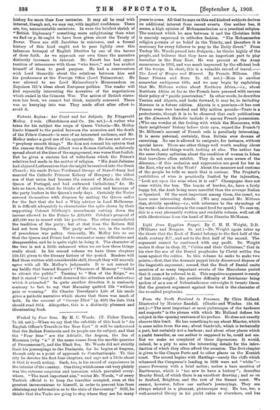Washed by Four Seas. By H. C. Woods. (T. Fisher
Unwin. Is. 6d. net.)—When we say that the sub-title of this book is "An English Officer's Travels in the Near East" it will be understood that the Balkan Peninsula and its people are its subject, and that the "Four Seas" are the Adriatic, the Aegean, the Sea of Marmara (why "a" if the name comes from the marble quarries of Proconnesus?), and the Black Sea. Mr. Woods did not strictly limit his journeyings to the Peninpula, for he begins at Smyrna, though only as a point of approach to Constantinople. To this city he devotes the first four chapters, and says not a little about it that is worth noting. Such, too, is his record of experiences in the interior of the country. One thingwhichname out very plainly was the extreme suspicion and terrorism which prevailed every- where. "The most important aim," writes Mr. Woods, "of every Turkish official is to keep the traveller occupied, even at the greatest *convenience to himself, in order to prevent him from obtaining any information as to the state of the country." Still, he thinks that the Turks are going to stop where they are for many
years to come. All that he eays on this and kindred subjects derives an additional interest from recent events, Our author has, it seems, a high opinion of Mohammedanism as a practical
The contrast which he sees between it and the Christian faith is scarcely expressed in orthodox fashion. "The XeliamMedati religion permits of no belief in the Trinity, and therefore it is necessary for every follower to pray to the Peity direct." From Turkey Mr. Woods passed into Bulgaria ; be thinks highly of the people, and believes that they have an important part to play hereafter in the Near East. He was present at the Army manoeuvres in 19Q6, and was much impressed by the efficient look of the troops. In short, this is a valuable record of travel.-- The Land of Mosque and Minaret. By Francis Miltoun. (Sir Isaac Pitman and Sons. 7s. 6d. net.)—Here is another somewhat ambiguous title, and we may begin by explaining that Mr. Miltoun writes about Northern Africa,—i.e., about Northern Africa so far as the French have pursued with success their policy of " pacific penetration." In other words, he describes Tunisia and Algeria, and looks forward, it may be, to including Morocco in a future edition. Algeria is a province—it has cost France some two hundred and fifty million pounds—Tunis is a protectorate, though it is to be observed that -such publications as the Almanach Hachette include it among French possessions. (Who can wonder at the feeling with which the Aferoccans, with their neighbours' history before their eyes, regard the Freneh ?) Mr. Miltoun's account of French rule is peculiarly interesting, It is more paternal, certainly, than Britain ever dreams of exercising. No one is allowed to emigrate, for instance, without special leave. There are other things well worth reading about in the book, and things worth looking at also. The author has the same cheery optimism about the condition of woman in Islam that travellers often exhibit. They do not seem aware of the dilemma,—if this seclusion and suppression are good for her in the East, why not in the West? About the manners and customs of the people he tells us much that is curious. The Prophet's prohibition of wine is practically limited by the injunction, "Look not upon the wine when it is red." Champagne does not come within the ban. The beasts of burden, &c., have a fairly happy lot, the Arab being more merciful than the average Italian or Spaniard. Of the most important among them, the camel, we have some interesting details. (We may remind Mr. Miltoun that, strictly speaking—i.e., with reference to the etymology of the word—the dromedary is the camel bred for speed.) To sum up, this is a very pleasantly written and readable volume, well set off with illustrations from the hand of Miss Blanche McManus.






































 Previous page
Previous page